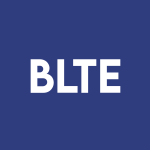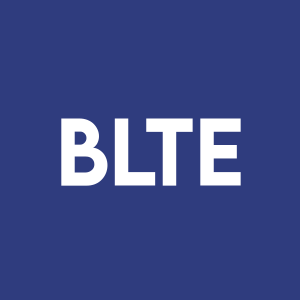Welcome to our dedicated page for Belite Bio news (Ticker: BLTE), a resource for investors and traders seeking the latest updates and insights on Belite Bio stock.
Stay informed about the latest developments from Belite Bio Inc, a clinical-stage biopharmaceutical company advancing novel oral therapies for retinal degenerative diseases and metabolic disorders. This news feed aggregates press releases, regulatory announcements, clinical trial updates, and market-moving events related to BLTE stock and the company's drug development programs.
Belite Bio focuses on developing treatments for conditions with significant unmet medical needs, including Stargardt disease type 1 (the most common inherited retinal dystrophy) and geographic atrophy (advanced dry age-related macular degeneration). The company's lead product candidate, Tinlarebant, represents a first-in-class oral RBP4 antagonist designed to reduce the accumulation of toxic bisretinoids that cause progressive vision loss in these blinding conditions.
Key news topics covered include clinical trial results and milestones for Tinlarebant in Stargardt disease and geographic atrophy patient populations, regulatory designations and approvals from the FDA and international health authorities, pipeline updates related to LBS-009 for metabolic diseases, corporate partnerships and licensing agreements, equity financing and capital markets activities, scientific presentations at ophthalmology and biotechnology conferences, and intellectual property developments protecting the company's anti-RBP4 platform technology.
Investors and patients following Belite Bio should pay particular attention to announcements regarding pivotal trial readouts, regulatory submission timelines, and commercialization strategies for Tinlarebant. The company has received multiple regulatory designations including Orphan Drug, Fast Track, and Breakthrough Therapy status, which may accelerate development timelines and facilitate market entry. As a clinical-stage company with no marketed products, news flow typically centers on clinical data releases, regulatory interactions, and funding activities that support advancement of the pipeline.
The company's expansion beyond ophthalmology into metabolic diseases with LBS-009 represents a strategic diversification that leverages the established safety and pharmacology of RBP4 modulation. News regarding preclinical data, investigational new drug applications, and early-stage clinical development of this program may signal long-term value creation opportunities in large patient populations affected by liver disease, diabetes, and metabolic syndrome.
Belite Bio has received the Sakigake (Pioneer Drug) designation from Japan's MHLW for its lead drug, Tinlarebant, aimed at treating Stargardt Disease (STGD1). Tinlarebant, an oral tablet, has shown promise in a 24-month Phase 2 trial by slowing the progression of atrophic lesions in adolescent STGD1 patients. 42% of participants with known ABCA4 mutations didn't develop new lesions, and no change in existing lesions was observed.
The global Phase 3 trial for adolescent STGD1, named 'DRAGON,' has completed enrollment, with interim results expected in Q4 2024. Additionally, the DRAGON II trial has started, and a global Phase 3 trial for Geographic Atrophy (GA) in Dry AMD, termed 'PHOENIX,' is ongoing. Tinlarebant has also received Orphan Drug Designation in Japan for STGD1 treatment.
Belite Bio (NASDAQ: BLTE), a clinical-stage biopharmaceutical firm, announced its participation in the Benchmark’s 4th Annual Healthcare House Call Investor Conference. The event, set for May 21 and 22, 2024, will be held virtually. Belite Bio's executive management will host a fireside chat at 3:00 pm ET on May 21, 2024. The company focuses on developing novel therapeutics for degenerative retinal diseases with significant unmet medical needs.
Belite Bio (NASDAQ: BLTE) announced its Q1 2024 results and provided a corporate update. The company highlighted positive data from its Phase 2 trial of Tinlarebant in STGD1 patients, showing sustained lower atrophic lesion growth. Tinlarebant is also being evaluated in ongoing Phase 3 trials (DRAGON and PHOENIX) for STGD1 and GA, respectively. Interim data from these trials are expected in Q4 2024. Financially, Belite raised $25 million through a direct offering and reported a net loss of $7.9 million for Q1 2024, up from $6.9 million in Q1 2023. The company held $95.5 million in cash and U.S. treasury bills as of March 31, 2024.
Belite Bio, Inc. (NASDAQ: BLTE) will participate in the H.C. Wainwright 2nd Annual BioConnect Investor Conference in New York on May 20, 2024. The company will host a fireside chat at 3:30 pm ET, accessible via webcast on their investor relations website.
Belite Bio, Inc. (NASDAQ: BLTE) will host a webcast on May 14, 2024, to discuss the first quarter 2024 financial results and provide a business update. The company is a clinical-stage biopharmaceutical drug development company focused on degenerative retinal diseases. The webcast will be held at 4:30 p.m. Eastern Time.
Belite Bio, Inc. (BLTE) will participate in a Key Opinion Leader Webinar to discuss Stargardt Disease and Geographic Atrophy and share insights on Tinlarebant, a novel therapeutic. The webinar, moderated by Cantor Fitzgerald, will feature Dr. Michel Michaelides, a renowned expert. Tinlarebant is a promising treatment with Fast Track, Rare Pediatric Disease, and Orphan Drug designations.
Belite Bio presented additional analysis from a Phase 2 study of Tinlarebant in Stargardt Disease at the ARVO Annual Meeting. The 24-month trial showed promising results in slowing lesion growth and stabilizing visual acuity. Genetic profiling revealed that despite severe ABCA4 variants, 42% of treated subjects did not develop atrophic retinal lesions. A novel lesion size quantification method was able to detect atrophic lesions more accurately. The drug is now being evaluated in Phase 3 trials for Stargardt Disease and Geographic Atrophy.
Belite Bio presented promising data on Tinlarebant, an oral tablet aimed at slowing disease progression in patients with retinal diseases at ARVO 2024. The Phase 2 trial showed a significant reduction in atrophic lesion growth in STGD1 patients compared to standard treatment. Enrollment for Phase 3 trials is complete, with interim data expected in Q4 2024.


